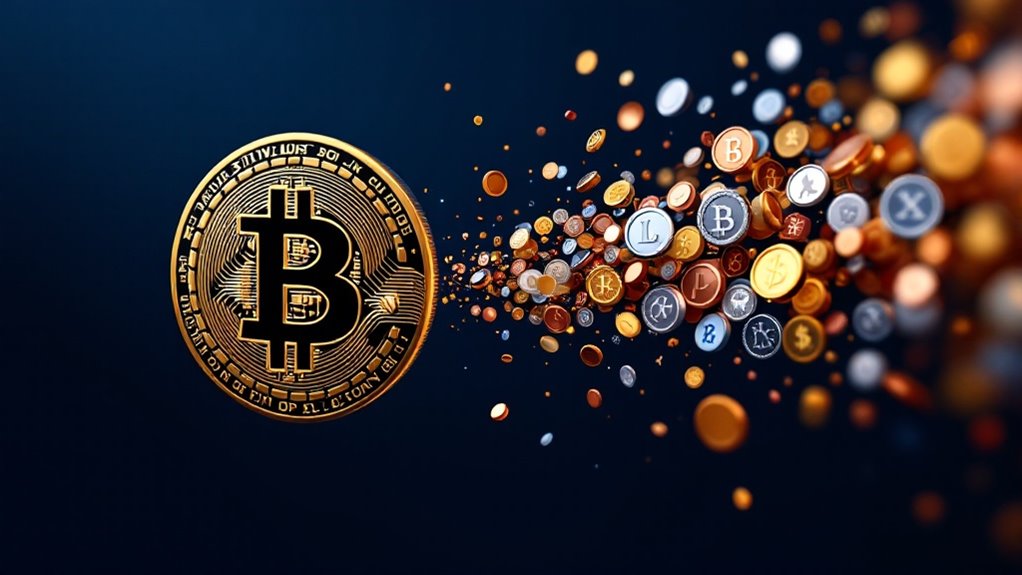Bitcoin and altcoins represent different paths in the cryptocurrency landscape. While Bitcoin stands as the original digital currency with a $1.74 trillion market cap and institutional backing, over 20,000 altcoins offer innovative alternatives. Think of Bitcoin as a reliable sedan versus altcoins as high-performance sports cars – higher risk but potentially greater rewards. Each serves unique purposes, from Bitcoin's "digital gold" status to altcoins' specialized functions in DeFi and smart contracts. The evolving ecosystem suggests exciting possibilities ahead.

While Bitcoin has long reigned as cryptocurrency's undisputed heavyweight champion, a vibrant ecosystem of alternative digital currencies, known as altcoins, has emerged to challenge its dominance. Since Namecoin's debut in 2011, the altcoin universe has exploded to over 20,000 digital contenders, each vying for its slice of the crypto pie.
Like younger siblings determined to step out of Bitcoin's shadow, these alternatives often bring fresh ideas and innovative solutions to the table. The innovative smart contract technology pioneered by many altcoins has revolutionized blockchain applications beyond simple transactions.
The numbers tell an intriguing story. Bitcoin's massive $1.74 trillion market cap towers over the altcoin landscape, yet the combined altcoin market of $1.13 trillion suggests there's plenty of room for healthy competition. With 537 categories tracked, the altcoin market showcases remarkable diversity in digital asset offerings.
Ethereum leads the altcoin charge with a respectable $249 billion market cap, proving that alternative approaches can attract serious investment. The platform's transition to proof-of-stake consensus has demonstrated its commitment to sustainable blockchain solutions.
Where Bitcoin resembles a steadfast tortoise, methodically processing transactions through its tried-and-true Proof-of-Work system, many altcoins are like nimble hares, experimenting with faster, more energy-efficient consensus mechanisms.
These younger cryptocurrencies often tackle specific niches, from Monero's privacy-focused transactions to the bustling world of decentralized finance on Ethereum's platform.
The investment landscape reflects this diversity. Bitcoin, like a blue-chip stock, offers relative stability and institutional acceptance, with giants like Tesla and Microsoft embracing it.
Altcoins, meanwhile, present a more adventurous path, promising higher potential returns balanced against greater risks. It's like choosing between a reliable family sedan and a collection of exotic sports cars – each has its place in the garage.
Looking ahead, the crypto ecosystem continues to evolve. Bitcoin's periodic halving events maintain its scarcity, while innovations like Ethereum 2.0 push the boundaries of what's possible in blockchain technology.
The future may not be a winner-take-all scenario, but rather a complex tapestry where Bitcoin and altcoins serve different purposes in our digital economy.
As regulatory frameworks mature and institutional adoption grows, the relationship between Bitcoin and its alternatives will likely settle into a more symbiotic arrangement, each finding its own unique role in the financial landscape.
Frequently Asked Questions
Why Do Some Altcoins Fail While Bitcoin Remains Stable?
Projects fail due to inadequate technological foundations, limited network effects, regulatory challenges, and market competition. Long-term sustainability requires proven technology, strong community support, and clear use cases demonstrating lasting value.
How Do Transaction Speeds Compare Between Bitcoin and Popular Altcoins?
Popular altcoins generally process transactions considerably faster than Bitcoin. While Bitcoin handles 3-7 transactions per second with 10-minute confirmations, alternatives like Solana and Avalanche process thousands per second with near-instant confirmations.
Which Altcoins Have the Potential to Surpass Bitcoin's Market Dominance?
Ethereum shows the strongest potential to challenge market dominance due to its smart contract capabilities and institutional adoption. Solana's high performance and growing ecosystem also positions it as a significant contender for future leadership.
Can Altcoins and Bitcoin Coexist in the Future of Cryptocurrency?
Evidence suggests multiple cryptocurrencies can coexist harmoniously, serving distinct purposes in the digital economy. Bitcoin's role as digital gold complements altcoins' specialized utilities in DeFi, smart contracts, and industry-specific applications.
What Security Measures Protect Bitcoin Compared to Newer Altcoins?
Bitcoin employs SHA-256 encryption and Proof-of-Work consensus, while newer cryptocurrencies utilize diverse security features like smart contract audits, zero-knowledge proofs, and Proof-of-Stake mechanisms for enhanced protection and efficiency.









